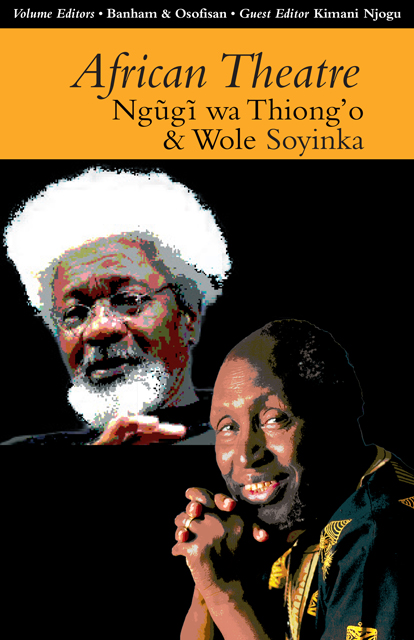Book contents
- Frontmatter
- Contents
- Notes on Contributors
- Obituary of Pat Amadu Maddy
- Introduction
- Reading & Performing African Drama: How Wole Soyinka & Ngũgĩ wa Thiong’o influenced my work
- Ayan Contra Ujamaa: Soyinka & Ngũgĩ as theatre theorists
- Encounters with Soyinka
- Encounters with Ngugi
- Wole Soyinka & Ngũgĩ wa Thiong’o: Plays in Production
- The Making of The Trial of Dedan Kĩmathi by Ngũgĩ wa Thiong’o & Mĩcere Gĩthae Mũgo at the University of California, Irvine: A personal reflection
- Playscript: A Rain of Stones
- Book Reviews
IV - Kamĩrĩĩthũ in Retrospect
Published online by Cambridge University Press: 23 February 2023
- Frontmatter
- Contents
- Notes on Contributors
- Obituary of Pat Amadu Maddy
- Introduction
- Reading & Performing African Drama: How Wole Soyinka & Ngũgĩ wa Thiong’o influenced my work
- Ayan Contra Ujamaa: Soyinka & Ngũgĩ as theatre theorists
- Encounters with Soyinka
- Encounters with Ngugi
- Wole Soyinka & Ngũgĩ wa Thiong’o: Plays in Production
- The Making of The Trial of Dedan Kĩmathi by Ngũgĩ wa Thiong’o & Mĩcere Gĩthae Mũgo at the University of California, Irvine: A personal reflection
- Playscript: A Rain of Stones
- Book Reviews
Summary
In ‘Kenyan Theatre after Kamĩrĩĩthũ’ I argued that
…in its use of a local language as the medium of a major theatre production, Kamĩrĩĩthũ broke new ground. The effort at class-conscious theatre done by, for, and with the lower classes was also something new in Kenyan theatre. No intellectuals had been involved in this kind of effort before, nor has it been reproduced since. In relocating Kenyan theatre from the petty-bourgeois base at the institution of higher learning to the workers and peasants, Kamĩrĩĩthũ was also successful. (1999: 73)
I also provocatively stated that that Kamĩrĩĩthũ was a product unique to the 1970s and early 1980s in Kenya:
Its effect on the Kenyan theatre scene was to a large extent dependent on Ngũgĩ and the intellectuals working with him, who were themselves products of the intellectual climate in the Kenya of the late 1970s and early 1980s. To the extent that Kamĩrĩĩthũ was successful, it also gave rise to conditions that made it difficult to reproduce its success. (The Drama Review, 1999:73)
A significant part of the article explored the obstacles presented by state
censorship of theatre in the post-Kamĩrĩĩthũ phase, the dearth of theatre practitioners willing to take the kind of risks Ngũgĩ took with his art and life in the 1970s and ‘80s, and the overall commercialization of the theatre that ironically sucked in the performers from the radical Kamĩrĩĩthu experiment of the 1970s. But much of that analysis was haunted by Ngũgĩ’s consistent proclamation that Kamĩrĩĩthũ would one day come back. The end of Ngũgĩ’s exile in 2004, his temporary return to Kenya, and the easing of state censorship calls for reflection on the successes of Kamĩrĩĩthũ and the lessons for the institutionalization of participatory theatre.
The official narrative of Kamĩrĩĩthũ has been told repeatedly in Ngũgĩ wa Thiong’o’s writings. This version has been celebrated in African theatre scholarship that foregrounds the transformative nature of the Kamĩrĩĩthũ experiment in creating popular theatre. But, by and large, this narrative appears to privilege the accounts of the most visible participants by virtue of their academic positions. In this paper, I interject the multiple – and sometimes contradictory – perspectives of the other participants in the theatre projects.
- Type
- Chapter
- Information
- African Theatre 13Ngugi wa Thiong'o and Wole Soyinka, pp. 53 - 59Publisher: Boydell & BrewerPrint publication year: 2014



